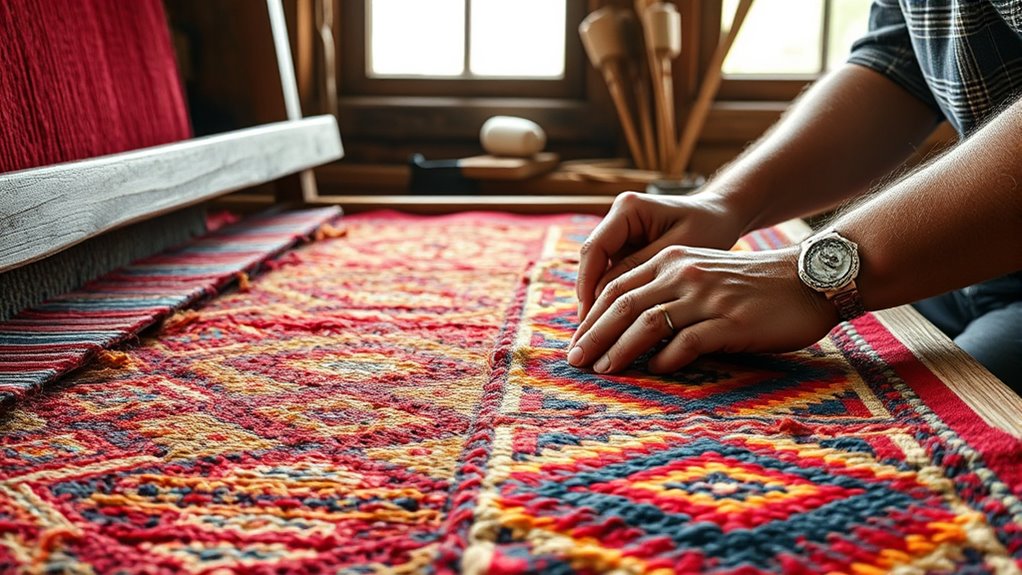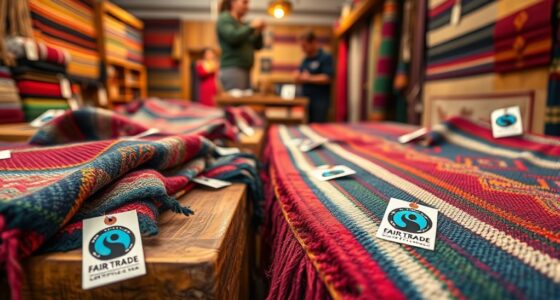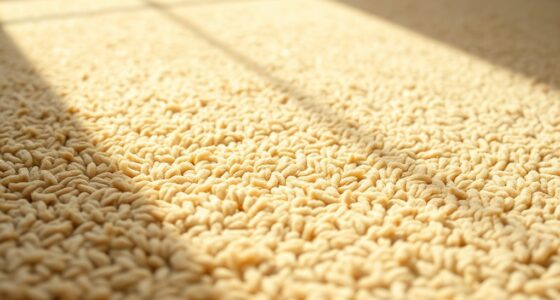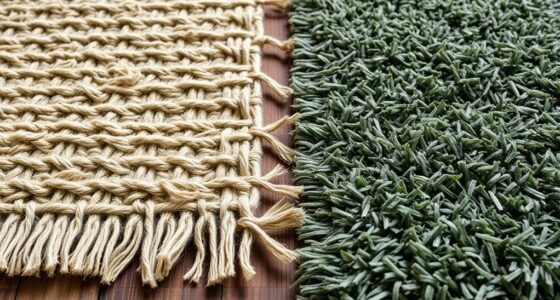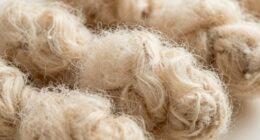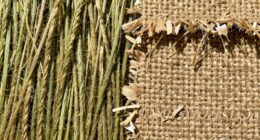When sourcing handmade rugs responsibly, you should prioritize fair wages, safe working conditions, and transparency from suppliers. Look for rugs made with organic materials and natural dyes to guarantee environmental safety. Supporting artisans who follow sustainable practices helps improve their communities and protect resources. By choosing ethically sourced rugs, you promote fair labor standards and eco-friendly production. Exploring these considerations further reveals how your choices can make a meaningful difference for artisans and the planet.
Key Takeaways
- Ensure rugs are sourced from certified fair trade organizations promoting transparency and fair wages for artisans.
- Prioritize rugs made with natural dyes and sustainable, organic materials to reduce environmental impact.
- Verify supply chains to prevent exploitation and support artisans’ fair compensation and safe working conditions.
- Choose brands committed to transparency, allowing consumers to trace the origin and ethical practices behind each rug.
- Support artisans and communities by purchasing from sources that promote sustainable livelihoods and community development.
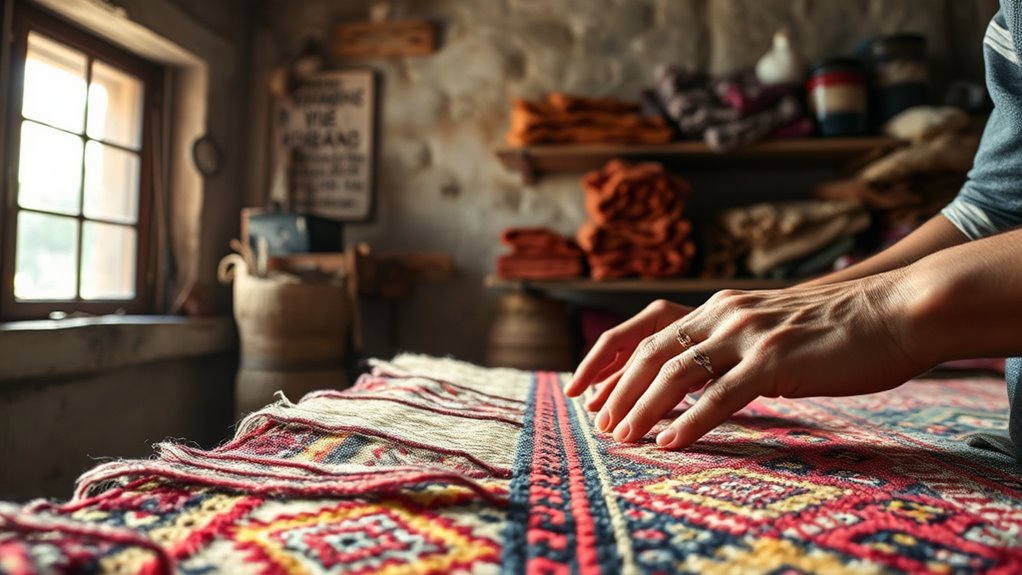
When choosing handmade rugs, responsible sourcing guarantees that your purchase supports ethical practices and sustainable livelihoods. This means considering how the rugs are made, who makes them, and the broader effects on communities and the environment. Fair labor standards are at the core of ethical sourcing. You want to *ascertain* that artisans and workers are paid fair wages, work in safe conditions, and aren’t exploited. Many artisans in developing regions work long hours for minimal pay, often in unsafe environments. By selecting rugs from companies that prioritize fair labor, you’re helping improve living standards, empower local communities, and promote dignity in craftsmanship. Certified fair trade organizations or brands committed to ethical practices typically provide transparency about their supply chains, making it easier for you to support these values.
Responsible sourcing ensures fair wages, safe working conditions, and supports ethical, sustainable craftsmanship in handmade rugs.
Environmental impact is another *crucial* consideration when sourcing handmade rugs responsibly. Traditional rug-making can be eco-friendly, especially if natural dyes and sustainable materials are used. However, some production processes may involve toxic chemicals or unsustainable resource extraction, harming ecosystems and contributing to pollution. When choosing rugs, look for those made with organic wool, natural dyes, and environmentally conscious manufacturing methods. These choices minimize your ecological footprint and help protect natural resources. Additionally, responsible sourcing involves reducing waste and energy consumption during production. Some companies implement eco-friendly practices, like recycling leftover materials or utilizing renewable energy sources, which further lessen environmental harm.
By supporting artisans who prioritize sustainable practices, you’re also encouraging a shift toward greener manufacturing processes. Your purchase can promote the use of eco-friendly materials, such as organic wool or natural dyes, which are better for the planet. *Furthermore*, responsible sourcing often involves transparent supply chains that trace the origin of each rug, ensuring no illegal or unethical practices are involved. This transparency not only reassures you about the integrity of your purchase but also holds producers accountable for their environmental and social responsibilities.
In essence, choosing responsibly sourced handmade rugs means aligning your values with your buying habits. It’s about making informed decisions that respect fair labor standards and reduce environmental impact. Your support can help foster a more ethical and sustainable rug industry, encouraging artisans to maintain traditional, eco-friendly practices. When you prioritize these considerations, you’re not just adding a beautiful piece to your home—you’re contributing to a more just and sustainable world. Every purchase becomes an act of advocacy, empowering artisans and protecting the environment, *guaranteeing* that the beauty and craftsmanship behind each rug are preserved for generations to come.
Frequently Asked Questions
How Can Consumers Verify the Ethical Claims of Rug Artisans?
To verify the ethical claims of rug artisans, you should look for brands that prioritize transparency practices and provide clear information about their sourcing. Ask for artisan verification details, such as certifications or direct communication with artisans. Research the company’s commitment to fair wages and ethical treatment. Supporting reputable, transparent sellers guarantees you’re investing in handmade rugs that are ethically produced and truly support the artisans behind them.
What Are the Environmental Impacts of Traditional Rug-Making Methods?
Imagine a scene where vibrant dyes bleed into water sources, risking ecosystems and communities. Traditional rug-making often relies on natural dyes, but some still use synthetic dyes, which can be harmful. Water consumption is significant, impacting local resources and habitats. While handmade rugs can be eco-friendly, the environmental footprint varies. You need to take into account these factors to make an informed choice that supports sustainable practices and minimizes ecological harm.
How Do Fair Trade Certifications Influence Sourcing Decisions?
Fair trade certifications influence your sourcing decisions by ensuring that rug producers meet strict certification standards. When you prioritize fair trade, you support ethical practices, fair wages, and sustainable materials. These standards also promote transparency and social responsibility, making your sourcing more ethical. By choosing certified rugs, you not only uphold responsible sourcing but also contribute to improved working conditions and environmental sustainability in the handmade rug industry.
Are There Specific Regions Known for More Ethical Rug Production?
You’ll find that regions like Persia, India, and Morocco are known for ethical rug production, rooted in regional craftsmanship and cultural traditions. These areas often uphold fair labor practices and sustainable methods, ensuring you’re sourcing rugs that respect artisans’ rights. By choosing rugs from these regions, you support authentic craftsmanship and help preserve cultural heritage, making your purchase both beautiful and ethically responsible.
What Role Do Local Communities Play in Responsible Sourcing Practices?
Think of local communities as the heartbeat of responsible sourcing. You empower these communities by supporting fair wages and ethical labor, helping them thrive. Their involvement guarantees cultural preservation, keeping traditional craftsmanship alive. When you prioritize community empowerment, you nurture trust and sustainability, transforming sourcing from a mere transaction into a meaningful partnership. This way, your rug’s story becomes one of respect, heritage, and shared prosperity.
Conclusion
By choosing responsibly sourced handmade rugs, you’re not just adding beauty to your space—you’re nurturing the hands that craft them and protecting the environment they come from. Think of your purchase as planting a seed of change, growing a future where craftsmanship and ethics go hand in hand. Every rug tells a story; make sure yours champions fairness and sustainability. Together, you can turn your home into a sanctuary of responsible beauty.
